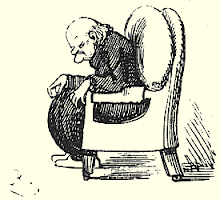She's in there-- somewhere, I guess. She's got to be. On outward appearance, it's the same bespectacled face, the same careworn hands, the same short, salt-and-pepper hair. It's got to be my mother.
Lately, though, I'm not so sure.
The wry smile is gone. I don't know that it's gone for good necessarily, but I haven't seen it-- not since December or thereabouts. That's when my brother-in-law was diagnosed with Stage IV metastatic cancer. That's when the reality set in that her first grandson was going to grow up having never known his father. "Buddy," my wife asked me tentatively last night during a rare, quiet moment in our house, "will your mother be sad for a very long time?"
"Yeah," I said, not looking at anything in particular, "I think so."
Tragedy doesn't visit our family. Death does, as it drops in on every family, but tragedy? Not so much. I went to my first funeral at age 9, but it was for Dr. Porter, our next door neighbor, who died at a ripe old age-- an irascible, bent over, shriveled up raisin in suspenders and tatty old Florsheims. People we know and people we love tend to die late in life, when they should. The only person who exited the world out-of-order was my mother's mother, who was felled by lymphoma-- but that was years before I was born. So I was not scarred.
But my mother was.
And maybe that's part of the reason why the death of her son-in-law at the age of 34, from cancer, no less, hit her so hard. Because she'd been there. She knew. She'd watched the woman she loved more than anything get eaten up, eaten alive, become barely recognizable. A shell. A shame.
Now that I have children, I see my mother more. For a while, while my brother-in-law was dying, I never saw my mother, because she was caring full-time for his son, while my sister was caring for her husband. Now that my brother-in-law is dead, my mother comes by to help me with the babies when I'm home with them alone. Part of it, I think, is because she feels guilty about missing their first few months. Part of it is because she's from the generation that is absolutely sure a father will kill his children through sheer incompetence and absent-minded negligence by putting them in the dishwasher when their diapers get dirty or something. Part of it, maybe, is because watching me be a father is one of the few small pleasures she gets to experience anymore.
Maybe. I don't know.
When she's with me at the house with the babies, conversation is quiet, and the content is either superficial, or it's sad. I can't manage to get us anywhere in between, and the fault is mine as much as it's hers. Sometimes, I find myself trying to keep it light, because I can't bear it when it's heavy-- sometimes I say deliberately inappropriate things just to get her to smile-- and, sometimes, it works. That's what I used to do at the dinner table when we were all young together. I'd make a cutting remark about a distant relative or someone from the neighborhood just to see my mother smile. I never thought then that the corners of her mouth turning up would ever mean so much to me.
Or happen so infrequently.
She's in there somewhere, I know, just like we're all in there somewhere-- who we were before cancer and before twins and before mortgages and cars we paid for ourselves and colleges we shouldn't have gone to and majors we shouldn't have chosen and girlfriends we shouldn't have slept with and friends we shouldn't have made. But did. We're all in there somewhere. My daughter is cooing downstairs and my son is sleeping in the next room and my wife, a mother, who's also in there, just finished pumping. And I'm wearing red and pink argyle socks, because, somewhere, I think I'm in there, too.
Lauren Soloy’s The Newest Gnome: A Quiet Adventure
9 months ago














You're still in there, and we're still out here. Even though we don't talk much.
ReplyDeleteHi!
Rosalie, like a true old friend would say (and have said): I don't write like I should.
ReplyDeleteHi back.